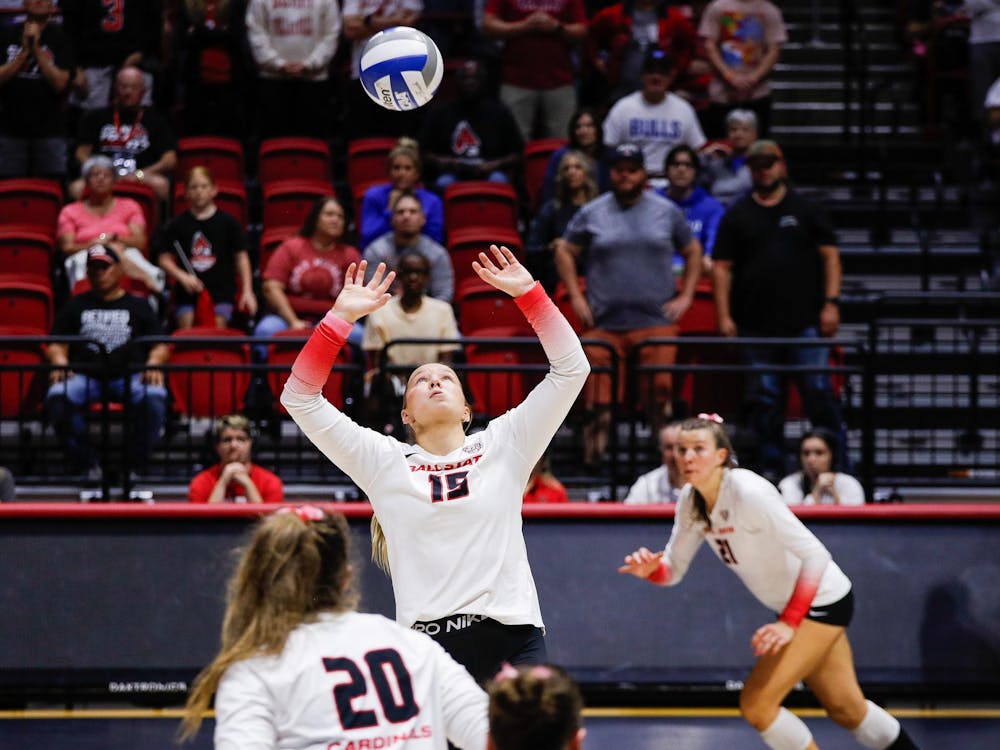Elissa Maudlin is a junior journalism news major and writes “Abstraction” for The Daily News. Her views do not necessarily reflect those of the newspaper.
If everything goes well, I am going to be a college graduate in 2023.
I will walk past my peers, family and other community members holding a diploma I’ve worked to obtain for four years. All those nights of getting homework done before an 11:59 p.m. deadline and the stress piled up on my shoulders will have been worth it. I’ll get a sustainable job, create a life for myself and everything will go according to the plan that’s been placed in my subconscious memory since I was in middle school: college graduates get the job and get to have the life they want.
However, what people fail to mention regularly is that college graduates leap out of the cozy plane they spent the last four years in without a parachute. The graduate jumps out of the plane and might land right on the cushion hundreds of feet down, perfectly safe in a comfortable job with a livable wage.
Or the graduate might be slightly off and miss the cushion when jumping out of the plane, or the cushion already protected too many other leaping graduates, refusing to give any grace to the falling graduate in question.
This graduate will fall smack dab onto the earth because no one really told them they needed a parachute.
As a junior, I don’t have the luxury of not thinking about what happens after I leave university and about that leap I’ll take in a little more than a year. For people in my grade and major, this is the time of feverishly typing out cover letter after cover letter, fixing the format on a resume for the 15th time and sending internship applications like our lives depend on them — because to some degree, they do.
The employment rate was 87 percent in 2019 for 25-34 year olds with a bachelor’s degree, according to the National Center for Education Statistics. Even though this statistic seems promising on the outside, that’s still 892,060 college graduates unemployed. Any of us could become one of them.
Some degrees hold more weight in this department than others. When it comes to 25-29 year olds with a bachelor’s degree in 2018, majors like computer and information sciences and English language and literature had higher than average unemployment rates for recent graduates, according to the U.S. Department of Commerce and Census Bureau. The average was 2.9 and their averages were 5.6 and 4.4, respectively.
So, is there any hope for fixing this situation of graduates not getting the job out of college?
I think the answer to this situation is educating ourselves and tackling the big question of, “what if I don’t have a job after graduation?” head on, instead of hiding it in the darkest corners of our mind and pushing it away with wishful thinking. I do think there is hope, but I think it’s in the very institutions we’ve spent the last four years in.
There’s a reason why colleges paint the narrative that your career is a guarantee — they are selling you a product, and that product is your education. Anyone who even understands what the word “marketing” means will have a clue that telling students there’s a slim chance you may not be able to give them the dream career they’ve always wanted is not the best marketing strategy.
Does that mean universities are really the bad guys? I don’t necessarily think so, but I do think they need to do a better job of preparing students for potentially facing months of unemployment, because for possibly 892,060 students in the United States, that could be our reality.
How does a person truly sustain themselves without work, or at least without the career they prepared for? Within specific fields of study, is there a way to do things on your own to make a little cash and be seen by potential employers? How does a student get to where they want to go?
These are the questions I think students truly care about. I don’t care about the luxuries a university has or the things it has done within the public’s gaze. I don’t even really care about Ball State’s 95 percent post-graduate employment rate calculated in 2018.
I care about the chance that statistic could fail me. I care about the back-up plan — the parachute that can support me when the higher education system pushes me out of the moving plane and gives me the chance to fly or fall hundreds of feet in the air.
Ball State costs $21, 086 for Indiana residents per year, including room and board, tuition and other fees associated with living on campus. For out-of-state residents, that figure becomes $38,320. Both figures do not include estimation for books, as this can differ from person to person. According to Education Data.org, 43.2 million people are in debt at an average of $39,351 due to student loans.
If 892,060 of those students have that debt in their name, it isn’t really an option not to know what to do if that job they are counting on and went into debt for doesn’t come right after graduation.
There is evidence that alternate career plans and courses designed to promote that increase the likelihood of having a job after college, according to a study done on undergraduate biology majors from the US National Institutes of Health’s National Library of Medicine. There was a 37 percent increase in students who wanted to achieve their original career plan, a 48 percent increase in students who had plans for an alternate route and a 16 percent increase in the number of students who indicated they had a job after they graduated.
Universities, like Cornell University, the University of Illinois Urbana-Champaign (with specifically the The Grainger College of Engineering) and Rice University (written by someone from Martel College) have pages on their website discussing the need for a back-up plan for after graduation.
Ball State does have a page on its website talking about a Parallel Plan, but it only refers to a back-up plan for one's major in school in case that student can’t pass the classes to get into the major or the major has too many people.
To me, that’s not really good enough. I don’t want to be sheltered from the cruel reality that I might have trouble getting a job after college, and I respect older adults who don’t shove that under the rug. It doesn’t mean a school is “bad” if they tell you statistically that getting a job is hard out of college — it’s simply realistic.
Give us financial classes on saving up money throughout our college careers to sustain us if we don’t get that livable wage right away. Give us classes on how to utilize our majors in a way that is self-employed, such as freelance opportunities for the more creative majors. Give us classes on networking on your own because the brief mention of it being important is not enough to teach students how it actually works in the real world.
As students, we need to be aware of the possibility of the picture-perfect portraits of our futures falling apart, and we need to ask for the right instruction from our universities to combat that possibility. No one can promise we won’t be in that 13 percent, but what universities can promise us — and what we can promise ourselves — is the education to know what to do if our future plan falls through.
We need a parachute.
Contact Elissa Maudlin with comments at ejmaudlin@bsu.edu or on Twitter @ejmaudlin.





